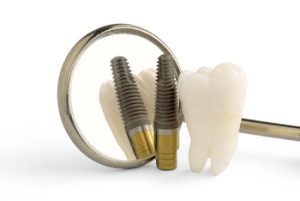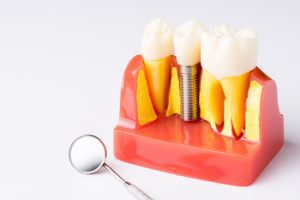As the demand for dental implant treatments rises, so does the allure of overseas options, particularly in Thailand. While the prospect of more affordable dental implant procedures may be enticing, examining the potential risks of low-cost treatments abroad is crucial. Moreover, we will debunk prevalent myths surrounding the seemingly high cost of dental implants in Australia, providing a comprehensive understanding of the factors influencing these expenses.
Cost Of Dental Implants In Thailand: Navigating The Risks Of Dental Tourism
Opting for dental implants in Thailand primarily due to cost considerations may lead to unforeseen consequences. While the upfront expenses might seem enticingly low, it is imperative to scrutinise the overall quality of dental implant treatment and the materials used. Cutting corners on these aspects can result in suboptimal outcomes, potentially jeopardising oral health in the long run.
 Lack Of Stringent Regulation: A Concern For Safety
Lack Of Stringent Regulation: A Concern For Safety
One significant risk associated with overseas dental procedures, including those in Thailand, is the variance in regulatory standards. Dental practices may not adhere to the same stringent regulations as those in Australia, raising concerns about infection control, sterilisation procedures, and the overall safety of the treatment environment. Patients must exercise caution and research the credentials and reputation of the chosen dental clinic to mitigate these risks.
Communication Challenges: Bridging The Language Gap
Effective communication is pivotal in any medical procedure, and language barriers can impede the clarity of instructions and expectations. While many Thai dentists are proficient in English, misunderstandings may still arise. Patients need to ensure a clear line of communication with their dental care team to avoid complications during and after the dental implant procedure.
Limited Recourse For Follow-Up Care: Addressing Complications
Choosing dental implants in Thailand may limit accessibility to follow-up care should complications arise post-procedure. The geographical distance can pose challenges for timely intervention and resolution of issues. Patients must carefully weigh the potential cost savings against the availability of comprehensive post-operative care and the peace of mind with local accessibility to healthcare services.
While the allure of cost savings may be compelling, individuals considering dental implants in Thailand must tread cautiously, thoroughly researching and understanding the risks associated with low-cost procedures overseas.
Debunking Myths About The Unjustified High Cost Of Dental Implants In Australia
Australia has often been perceived as having excessive dental implant costs, deterring some individuals from pursuing this transformative treatment. However, it is crucial to dispel these myths and clarify the factors contributing to the seemingly high cost of dental implants in Australia.
Quality Comes At A Price: Understanding The Investment
One common misconception is that the high cost of dental implants in Australia is unjustified. The expense often reflects the stringent quality standards, cutting-edge technology, and skilled professionals involved in the dental implantation process. High-quality materials, state-of-the-art facilities, and ongoing education for dental professionals contribute to the overall investment in ensuring the best possible outcomes for patients.
Comprehensive Treatment Planning: A Crucial Factor
Contrary to the belief that costs are inflated, the comprehensive nature of dental implant treatment in Australia is a key contributor to its perceived expense. The process involves thorough assessment, treatment planning, and personalised care, ensuring that each patient’s unique oral health needs are addressed. This meticulous approach contributes to the overall success and longevity of dental implants.
Regulatory Standards: Upholding Patient Safety
Australia boasts stringent regulatory standards governing dental practices. These standards are in place to prioritise patient safety, infection control, and the overall quality of healthcare services. Compliance with these standards necessitates ongoing training, adherence to strict protocols, and regular assessments—all of which contribute to the cost of dental implant procedures.
Post-Operative Care: Ensuring Long-Term Success
The cost of dental implants in Australia encompasses the surgical procedure and crucial post-operative care. Follow-up appointments, monitoring of healing progress, and timely interventions, if issues arise, contribute to the overall investment. This commitment to comprehensive care ensures dental implants’ long-term success and durability.
Dispelling these myths is essential for individuals considering dental implant treatment in Australia.
Factors Influencing The Cost Of Dental Implants In Australia
Understanding the various factors contributing to the overall cost of dental implants in Australia is crucial for individuals contemplating this transformative procedure. From the materials used to the expertise of dental professionals, each element plays a role in determining the investment required to achieve a radiant and functional smile.
 Quality Of Materials: A Cornerstone Of Success
Quality Of Materials: A Cornerstone Of Success
The choice of materials significantly influences the cost of dental implants. High-quality materials, such as titanium for implant posts and durable ceramic or porcelain for crowns, contribute to the longevity and success of the implant. While these materials may incur higher initial costs, they are a worthy investment in durability and aesthetic appeal.
Professional Expertise: Skilled Hands, Successful Outcomes
The dental professionals’ expertise in the implantation process is a fundamental factor in the overall cost. Experienced dental professionals ensure precise surgical procedures, effective treatment planning, and meticulous post-operative care. The commitment to continuous education and training also adds to the expertise, contributing to the overall investment in dental implant treatments.
Technological Advancements: Precision And Innovation
Integrating cutting-edge technology in dental implant procedures enhances precision, efficiency, and patient outcomes. State-of-the-art diagnostic tools, 3D imaging, and computer-guided implant placement contribute to the overall cost. However, these advancements play a pivotal role in ensuring the accuracy of the treatment and minimising risks, ultimately benefiting the patient in the long run.
Clinic Facilities And Amenities: Comfort And Care
The facilities and amenities dental clinics provide also influence the cost of dental implants. Well-equipped clinics with a comfortable environment contribute to the overall patient experience. From advanced sterilisation equipment to a welcoming ambience, these factors are part of the investment made by dental practices to ensure optimal patient care throughout the treatment journey.
Customisation And Complexity: Tailoring Treatment To Individuals
Dental implant treatments are inherently personalised, addressing each patient’s unique needs. The complexity of the case, the number of implants required, and the need for additional procedures, such as bone grafting or sinus lifts, contribute to the overall cost. Customisation ensures that the treatment aligns with the individual’s oral health goals, but it also adds to the intricacy and, consequently, the investment.
By unravelling the intricacies of these factors, individuals can gain a holistic understanding of why dental implants in Australia may carry a certain cost.
Benefits Of Dental Implants: The Value Of High-Quality Materials

Longevity And Durability: A Lasting Investment
High-quality materials, such as medical-grade titanium for implant posts and robust crown ceramics, contribute to dental implants’ longevity and durability. This translates to a lasting investment that minimises the need for frequent replacements or repairs, ultimately reducing the overall cost of maintaining a healthy and functional smile over time.
Aesthetics And Natural Feel: Seamless Integration
The aesthetic appeal of dental implants is paramount, especially when crafted from high-quality materials. Implants made with precision and attention to detail closely mimic the appearance and feel of natural teeth. The seamless integration of these implants enhances the overall cosmetic result, providing patients with a confident and natural-looking smile.
Reduced Risk Of Complications: Optimal Healing And Functionality
Using high-quality materials in dental implants is associated with a lower risk of complications. Biocompatible materials, such as titanium, promote optimal healing and integration with the jawbone. This reduces the likelihood of implant failure and complications, ensuring patients enjoy restored functionality and oral health without concern.
Biocompatibility: Harmony With Oral Tissues
High-quality dental implant materials are carefully selected for their biocompatibility with oral tissues. This compatibility promotes a harmonious relationship between the implant and the surrounding structures, fostering healthy bone integration and minimising the risk of adverse reactions. Patients can benefit from a stable and well-integrated dental implant that feels natural within the oral cavity.
Minimised Maintenance: Streamlined Oral Care
Choosing high-quality materials for dental implants streamlines oral care and maintenance. These materials resist decay and discolouration, requiring minimal special care beyond regular oral hygiene practices. This ease of maintenance adds to the overall convenience and cost-effectiveness of high-quality dental implants.
The benefits of investing in high-quality materials for dental implants extend far beyond the initial procedure. Patients can enjoy a durable, aesthetically pleasing, and seamlessly integrated solution that contributes to their well-being.
Types Of Dental Implants And Their Impact On Overall Cost
The diversity of types of dental implants allows for tailored solutions to meet each patient’s unique needs. However, the choice of implant type plays a significant role in determining the overall cost of the dental implant procedure. Let’s explore the different types and understand their contributions to the investment in achieving a confident and functional smile.
Traditional Endosteal Implants: Robust Foundation
Traditional endosteal implants, the most common type, are surgically placed directly into the jawbone. These implants provide a robust foundation for supporting individual crowns, bridges, or dentures. The straightforward placement procedure contributes to a more cost-effective option compared to some alternative implant types.
Subperiosteal Implants: Addressing Bone Resorption
Subperiosteal implants are positioned on the jawbone but beneath the gum tissue. This type is often recommended when there is significant posterior bone loss. While subperiosteal implants can be a viable solution for specific cases, their customised design and the need for additional procedures, such as CT scans for precise placement, contribute to a higher overall cost.
Mini Dental Implants: Limited Applications
Mini dental implants, characterised by their smaller size, are suitable for specific applications, such as stabilising lower dentures. While mini implants may be a more cost-effective choice for certain cases, their limited versatility and reduced load-bearing capacity might necessitate additional implants, impacting the overall cost in complex scenarios.
Immediate-Function Implants: Expedited Results
Immediate-function implants, also known as same-day implants, allow for the placement of a temporary crown or denture shortly after implant surgery. While convenient for patients seeking quick results, this expedited process may involve additional planning, high-quality components, and a higher initial investment than traditional implant procedures.
Full-Mouth Implants: Comprehensive Solutions
Full-mouth dental implant systems provide comprehensive solutions for individuals with extensive tooth loss. These systems use fewer implants to support a full arch of teeth, reducing the overall cost compared to placing individual implants for each missing tooth.
The choice of dental implant type should align with individual needs and considerations. While certain types may present cost advantages, it’s essential to weigh the benefits and limitations of each when determining the most suitable solution.
Materials Used In Dental Implants In Australia: A Pivotal Factor In Overall Cost

Implant Posts: The Strength Of Titanium
The majority of dental implant posts are crafted from medical-grade titanium. This material is renowned for its strength, biocompatibility, and ability to integrate seamlessly with the jawbone—a process known as osseointegration. While titanium implant posts may incur a higher initial cost, their exceptional durability and compatibility contribute to the long-term success of the implant.
Abutments: Connecting Stability And Aesthetics
Abutments connecting the implant post to the dental crown or prosthesis can be made from various materials, including titanium, zirconia, or ceramic. The choice of abutment material influences the implant’s stability and aesthetic appearance. While titanium abutments are common and cost-effective, custom abutments crafted from materials like zirconia contribute to a more natural-looking result, albeit at a higher cost.
Crowns And Prosthetic Components: Aesthetic Excellence
The visible part of the dental implant—the crown or prosthetic component—is typically made from materials such as ceramic or porcelain. These materials are chosen for their aesthetic qualities, mimicking the appearance and translucency of natural teeth. While ceramic or porcelain crowns contribute to the overall cost, their ability to blend seamlessly with natural teeth enhances the cosmetic outcome of the dental implant.
Hybrid Materials: Balancing Strength And Aesthetics
In some cases, hybrid materials combining metals and ceramics are used as implant components. For example, a zirconia-reinforced framework combined with ceramic overlays may balance strength and aesthetic appeal. Using hybrid materials involves additional craftsmanship and precision, contributing to a higher overall cost.
Biocompatible Coatings: Enhancing Integration
Biocompatible coatings may be applied to implant surfaces to enhance dental implant integration with the surrounding tissues. These coatings, such as hydroxyapatite or plasma-sprayed coatings, promote faster osseointegration. While applying biocompatible coatings adds to the cost, it is an investment in optimising the success and longevity of the dental implant.
Understanding the significance of materials in dental implants allows individuals to appreciate the value of investing in high-quality components.
What To Expect When Getting Your Dental Implant Surgery In Australia
Embarking on the journey to receive dental implants in Australia involves a comprehensive process, from the initial consultation to post-operative care. Understanding what to expect at each stage empowers individuals to make informed decisions and ensures a smooth and successful dental implant experience.
Initial Consultation: Personalised Assessment
The dental implant journey begins with an initial consultation, where a qualified dentist assesses the patient’s oral health, discusses treatment goals, and outlines a personalised plan. This stage is crucial for understanding the patient’s unique needs, determining the suitability of dental implants, and discussing the associated costs.
Treatment Planning: Meticulous And Customised
Following the initial consultation, a comprehensive treatment plan is developed. This plan considers factors such as the number of implants needed, the type of implant, additional procedures required (such as bone grafting or sinus lifts), and the choice of materials. Meticulous planning ensures a tailored approach, setting the foundation for a successful implantation process.
Implant Placement: Surgical Precision
The actual implant placement is a surgical procedure conducted by a skilled dentist. The chosen implant type is precisely positioned in the jawbone, and, if needed, additional procedures are performed concurrently. This stage demands surgical expertise, and the cost reflects the dental professionals’ skills, the procedure’s complexity, and the materials used.
Healing Period: Osseointegration And Patience
After implant placement, a healing period is essential to allow for osseointegration—the fusion of the implant with the jawbone. Patients should expect a healing period of several weeks to months, during which post-operative care and adherence to oral hygiene are crucial. The duration of this phase contributes to the overall treatment timeline and associated costs.
Abutment Placement And Impressions: Progressing Towards Restoration
Once osseointegration is successful, abutments are placed on the implant posts. These abutments act as connectors for implanting crowns or prosthetic components. Impressions are taken to ensure precise customisation of the final restoration, marking a significant step towards completing the dental implant process.
Final Restoration: Aesthetic Completion
The final stage involves the attachment of custom crowns or prosthetic components to the implant abutments. This restoration is crafted with attention to detail, ensuring a natural and aesthetically pleasing result. The use of high-quality materials and the expertise involved in this phase contribute to the overall cost of the dental implant procedure.
Understanding these stages empowers individuals to navigate the dental implant process with confidence.
Additional Procedures In the Dental Implant Journey: Enhancing Success
While dental implant procedures offer a transformative solution for missing teeth, certain cases may necessitate additional procedures to ensure optimal outcomes. These procedures are tailored to address specific challenges and pave the way for a successful and enduring dental implant experience.
Bone Grafting: Augmenting Jawbone Density
Bone grafting may be recommended when the jawbone lacks the necessary density to support dental implants. This procedure involves grafting bone material onto the deficient areas, providing a stable foundation for implant placement. While bone grafting enhances the success of implants, it adds dimension to the overall cost and treatment timeline.
Sinus Lift: Overcoming Space Limitations
In cases where the upper jaw has limited vertical space due to sinus cavities, a sinus lift may be necessary. This procedure involves lifting the sinus membrane to create additional space for implant placement. Sinus lifts contribute to the overall success of implants in the upper jaw but introduce additional considerations and costs.
Saving Money On Your Dental Implant Cost In Australia
While dental implants represent a significant investment in oral health and aesthetics, there are strategic approaches individuals can adopt to manage costs without compromising on quality. Understanding cost-saving measures empowers patients to make informed decisions and embark on their dental implant journey with financial prudence.
Dental Insurance: Exploring Coverage Options
Investigating dental insurance plans can significantly alleviate the financial burden of dental implant procedures. While coverage may vary, some plans offer benefits or partial reimbursement for implant treatments. Consulting with insurance providers to understand coverage specifics and exploring policies that cater to dental implants can provide valuable financial support.
Government Assistance Programmes: Exploring Options
In some cases, government assistance programmes or subsidies may be available to individuals undergoing essential dental procedures. Exploring potential financial support from government initiatives can provide a valuable avenue for cost savings.
Payment Plans: Flexible Financial Solutions
Many dental clinics offer flexible payment plans to accommodate patients’ financial needs. Enquiring about payment options, including instalment plans or financing, allows individuals to spread the cost over manageable periods. This can make dental implants more accessible without requiring a lump-sum payment.
Maintenance And Prevention: Preserving Your Investment
Investing in proactive oral care, including regular dental check-ups and maintenance, is essential for preserving the longevity of dental implants. Preventing complications through diligent oral hygiene practices and timely professional interventions can save on potential future costs associated with repairs or replacements.
By combining these strategies, individuals can wisely navigate the financial aspects of dental implant procedures in Australia.
Frequently Asked Questions
 Are dental implants painful?
Are dental implants painful?
While discomfort is expected during the initial healing period, the procedure is performed under anaesthesia, ensuring minimal pain. Post-operative pain is typically managed with prescribed medications.
How long do dental implants last?
With proper care and maintenance, dental implants can last a lifetime. Regular dental check-ups and good oral hygiene practices contribute to the longevity of implants.
What is the recovery time for dental implants?
Recovery time varies but generally ranges from a few weeks to several months. It includes the healing of the surgical site and the integration of the implant with the jawbone.
Can anyone get dental implants?
Most individuals with good general health are candidates for dental implants. Factors such as bone density and overall oral health are considered in the assessment during the initial consultation.
How much do dental implants cost in Australia?
The cost of dental implants in Australia varies based on the number of implants, materials used, and any additional procedures needed. The cost per implant ranges from a few thousand to several thousand dollars.
Does dental insurance cover implants?
Dental insurance coverage for implants varies among plans. Some policies provide partial coverage, while others may not cover implant procedures. It’s advisable to check with insurance providers to understand the coverage specifics.
Are there risks associated with dental implants?
While dental implants are generally safe, risks include infection, implant failure, and complications during the healing period. Choosing a qualified local dentist, following post-operative care instructions, and attending regular check-ups minimise these risks.
How soon can I resume normal activities after implant surgery?
The recovery period may initially involve restrictions on certain activities, but most individuals can resume normal activities within a few days to a week. Strenuous activities may need to be avoided for a longer period.
Can smokers get dental implants?
Smoking can negatively impact the success of dental implants. It is advisable for individuals who smoke to quit or reduce smoking before and after the procedure to enhance the chances of successful implantation.
What happens if an implant fails?
Implant failure is rare but can occur due to various reasons. If an implant fails, the dentist will assess the situation and determine an appropriate course of action, possibly replacing the implant.
Getting High-Quality Dental Treatment To Restore Your Smile
Pursuing dental implants in Australia is a significant step towards achieving a confident and functional smile. Understanding the various aspects surrounding the cost of dental implants, the procedures involved, and the factors influencing the overall investment is crucial for making informed choices.
Ultimately, pursuing dental implants in Australia demands a balance between cost considerations and the desire for a lasting, high-quality solution. By being informed, proactive, and seeking the guidance of qualified dental professionals, individuals can confidently embark on their dental implant journey, knowing they are making a well-informed investment in their oral health and overall well-being.
Contact Carindale Family Dentist, QLD, to replace your missing teeth with high-quality implants at.
Carindale QLD 4152: (07) 3324 9172
Mt Gravatt East QLD 4122: (07) 3324 9104
Note: Any surgical or invasive procedure carries risks. Before proceeding, you should seek a second opinion from an appropriately qualified health practitioner.
Sources
5 Reasons Why Dental Implants Are so Popular | College of Dentistry | University of Illinois Chicago. dentistry.uic.edu/news-stories/5-reasons-why-dental-implants-are-so-popular.
Adams, Lina. “Beware of Language Barriers, Dental Tourists Warned – Dentistry.” Dentistry.co.uk, 30 Aug. 2023, dentistry.co.uk/2023/08/24/beware-of-language-barriers-dental-tourists-warned.
Bhatiya, Rehan. “Understanding the Factors Influencing Dental Implants Cost.” Medium, 25 Aug. 2023, medium.com/@rehanbhatiya/understanding-the-factors-influencing-dental-implants-cost-79de6517a8da.
Bsdh, Laurie Magallan Rdh. “Dental Tourism: Making Patients Aware That the “Bargain” Could Be a Big Mistake.” Today’s RDH, 16 June 2023, www.todaysrdh.com/dental-tourism-making-patients-aware-that-the-bargain-could-be-a-big-mistake.
Colgate. “Bone Graft for Dental Implants: Understanding the Possibility.” Colgate, 22 Mar. 2022, www.colgate.com/en-us/oral-health/implants/bone-graft-for-dental-implants-understanding-the-possibility.
Dental Implant Surgery – Mayo Clinic. 29 Jan. 2019, www.mayoclinic.org/tests-procedures/dental-implant-surgery/about/pac-20384622.
Dental Tribune International. “DT News – International – Risks of Dental Tourism …” Dental Tribune International, 13 July 2017, www.dental-tribune.com/news/risks-of-dental-tourism-highlighted-by-ada.
Pai, Aditi. “Dental Implants: Five Myths Debunked.” India Today, 20 Dec. 2022, www.indiatoday.in/india-today-insight/story/dental-implants-five-myths-debunked-2311504-2022-12-20.
Robinson, Kara Mayer. “Types of Dental Implants.” WebMD, 2 May 2022, www.webmd.com/oral-health/types-dental-implants.
Sinus Lifts for Implant Treatment | Bupa Dental Care. www.bupa.co.uk/dental/dental-care/treatments/dental-implants/supporting-treatments/sinus-lifts.
Steinheimer, Lauren. “5 Ways to Get Low-Cost Dental Implants.” NewMouth, 9 Feb. 2024, www.newmouth.com/blog/low-cost-dental-implants.
Zirconia or Titanium Dental Implants | Materials, Properties and Strengths of Tooth Implants. www.click4teeth.com/feature-articles/what-materials-dental-implants.




 Lack Of Stringent Regulation: A Concern For Safety
Lack Of Stringent Regulation: A Concern For Safety Quality Of Materials: A Cornerstone Of Success
Quality Of Materials: A Cornerstone Of Success Are dental implants painful?
Are dental implants painful?